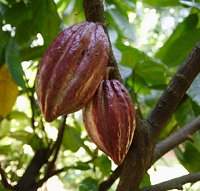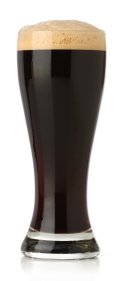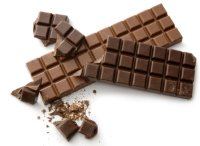chocolate education
Chocolate and Beer Pairing – Pale Ales
August 1, 2010
In the opening post of this series I mentioned that there are three categories of beer that pair well with chocolates.

India Pale Ale was created in the 1820’s for the voyages between England and India. The three month voyage would have to cross the equator twice. So not only was the journey long, but it was also quite warm. Since time and high temperatures are bad for beer preservation, typical beers sent to India arrived in very poor condition.
Read more
The Spread of Cacao Around the World
July 29, 2010
I was recently asked about the spread of Cocoa or Cacao trees around the world.

The Aztecs ground cacao into Xocoatl, a chocolate drink used mostly for spiritual and ceremonial rituals.
Hernan Cortés is credited with bringing cacao to Spain where it spread throughout Europe in the 1500’s and 1600’s.
Read more
Chocolate and Beer Pairing – Belgian Ales
July 25, 2010
In the opening post of this series I mentioned that there are three categories of beer that pair well with chocolates.

These beers are typically amber to brown in color, with high alcohol content (often greater than 8%) and are usually quite fruity in their aroma. Candy sugar (like a hard rock candy) may be added to the barley malt to increase the alcohol level without darkening the color or making it too malty.
Read more
Orange Zest Seized My Chocolate
July 22, 2010
Recently, I was asked this question: “I love the taste of chocolate and orange but when I add orange zest to my coating it curdles. Why?”

The issue is moisture.
Read more
Defining “Quality” Chocolate
July 14, 2010
Every chocolate shop I visit insists that their chocolate is the best quality, gourmet, premium. So, when talking about chocolate, what does “quality” mean exactly?
The U.S. FDA has produced formal standards of identity that legally define chocolate and all its related ingredients and by-products. But, read through all that and you will discover there is nothing that defines the “quality” of chocolate.
Of course there are standards of “Quality Assurance” within each processing step of making chocolate. These control standards start with the cocoa bean and follow through to the finished product. But following these rules means that pretty much any final chocolate available for purchase could be defined as being a “quality” chocolate.
Read more
Chocolate and Beer Pairing – Stouts
July 9, 2010
In the opening post of this series I mentioned that there are three categories of beer that pair well with chocolates.

These beers are made using a good deal of roasted or burnt barley malt. In fact, one of the burnt barley malts is even called “chocolate malt.” It doesn't really have any chocolate in it, but rather the malt has been roasted or kilned until it acquires more of a chocolaty color.
Read more
S’mores
July 5, 2010
A S’more is considered a summer time classic by many. It brings back memories of camping and backyard barbeques. And, of course, it just tastes good.

Meanwhile put a piece of chocolate on a graham cracker. After the marshmallow turns a golden brown, you pull it off the stick, place it on top of the chocolate, and top with another graham cracker. The warm marshmallow melts the chocolate and voilà! a s’more is born.
Read more
Does Fair Trade Chocolate Taste Good?
June 24, 2010
What is Fair-trade chocolate, and does it taste as good as non-fair trade chocolate?
The Fair Trade chocolate model is intended to ensure cacao farmers receive a fair price for their harvest. Fair trade seeks to create more trade links between farmer and buyer with the intent of eliminating the “middleman.”
It is about sustainability, responsible farming, and supplying a community of growers with better education, health care, and the elimination of child and slave labor. It all sounds like good stuff.
Chocolate and Beer Pairing
June 16, 2010
When most people think about pairing chocolate with an alcoholic beverage the product they usually consider is wine. However, there are components in wine which can make these pairings difficult and often unpredictable.
Tannins in red wine can make dark chocolates seem more bitter, and the acidity in wines often does not balance well with the chocolate. Because of the variation in wine styles, even within varietals, it’s often difficult to generalize about ideal wine and chocolate pairings.

Read more
Is Milk Chocolate Inferior to Dark Chocolate?
June 8, 2010
I was asked a question like this recently, "is milk chocolate considered inferior to dark chocolate?"

Not as “in”? Yes.
Read more

